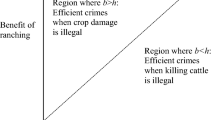Abstract
We investigate the influence of a judge’s objective function on the type of sanctions used for enforcing environmental standards. We focus on the difference between monetary and non-monetary penalties. We examine the extent to which judges take social costs of sanctions into account when making judgments in court in the context of environmental violations. We also conduct an empirical analysis to test the main findings of the theoretical model using court data from several Belgian jurisdictions. We find that besides minimizing environmental damages judges also take social costs of sanctions into account in their decision-making.
Similar content being viewed by others
References
Arguedas C. (2008) To comply or not to comply? Pollution standard setting under costly monitoring and sanctioning. Environmental and Resource Economics 41(2): 155–168
Becker G. S. (1968) Crime and punishment: An economic approach. Journal of Political Economy 76(2): 169–217
Billiet C. M., Rousseau S., Balcaen A., Meeus R., Styns K., De Meyer G. et al (2009) Milieurechtshandhaving: Een databank voor onderzoek naar de penale en bestuurlijke santioneringspraktijk. Tijdschrift voor Milieurecht 18(2): 128–150
Braithwaite J. (2002) Restorative justice and responsive regulation. Oxford University Press, New York
Cohen, M. A. (1999). Monitoring and enforcement of environmental policy. In T. Tietenberg & H. Folmer (Eds.), International yearbook of environmental and resource economist (Vol. III, pp. 44–106). Cheltenham UK: Edward Elgar Publishers.
Daughety A. F., Reinganum J. F. (2000) On the economics of trials: Adversarial process, evidence and equilibrium bias. Journal of Law, Economics and Organization 16(2): 365–394
Earnhart D. (1997) Enforcement of environmental protection laws under communism and democracy. Journal of Law and Economics 40: 377–402
Eaton T. A., Mustard D. B., Talarico S. M. (2005) The effects of seeking punitive damages in the processing of tort claims. Journal of Legal Studies 34: 343–369
Eckert H. (2004) Inspections, warnings and compliance: The case of petroleum storage regulation. Journal of Environmental Economics and Management. 47: 232–259
Firestone J. (2003) Enforcement of pollution laws and regulations: An analysis of forum choice. Harvard Environmental Law Review 27: 105–176
Fon V., Parisi F. (2006) Judicial precedents in civil law systems: A dynamic analysis. International Review of Law & Economics 26: 519–535
Heckman J. (1979) Sample selection bias as a specification error. Econometrica 47: 153–161
Helland E. (2001) Prosecutorial discretion at the EPA: Some evidence on litigation strategy. Journal of Regulatory Economics 19(3): 271–294
Keeler A. G. (1995) Regulatory objectives and enforcement behavior. Environmental and Resource Economics 6: 73–85
Levy G. (2003) Careerist judges and the appeals process. RAND Journal of Economics 36(2): 275–297
Meeus R. (2007) De handhavingsplicht van de lidstaten van de Europese Unie in het communautair milieurecht. Tijdschrift voor Milieurecht 6: 311–359
Monsieurs A., Rozie J., Vanderhallen M. (2009) Consistenten bestraffing: Utopie of realiteit?. Rechtskundig weekblad 10: 90–103
Nyborg K., Telle K. (2006) A dissolving paradox: Firms’ compliance to environmental regulation. Environmental and Resource Economics 35(1): 1–18
Polinsky A. M., Shavell S. (1994) Should liability be based on the harm to the victim or the gain to the injurer?. Journal of Law Economics and Organization 10: 427–437
Polinsky A. M., Shavell S. (2000) The economic theory of public enforcement of law. Journal of Political Economy 102(5): 1039–1066
Posner R. A. (1993) What do judges maximize? (The same thing everybody else does). Supreme Court Economic Review 3: 1–41
Rasmussen E. (1994) Judicial legitimacy as a repeated game. Journal of Law, Economics, and Organization 10: 68–83
Rousseau, S. (forthcoming). Empirical analysis of sanctions for environmental violations. International Review of Environmental and Resource Economics. doi:10.1561/101.00000024.
Rousseau, S., & Billiet, C. M. (2005). How to determine fining behavior in court? Game theoretical and empirical analysis. ETE Working Paper Series, N2005-10.
Rousseau S., Proost S. (2005) Comparing environmental policy instruments in the presence of imperfect compliance—A case study. Environmental and Resource Economics 32(3): 337–365
Rousseau S., Proost S. (2009) Relative cost efficiency of market-based environmental policy instruments with imperfect compliance. International Tax and Public Finance 16(1): 25–42
Solum L. B. (2004) Procedural justice. Southern California Law Review 78: 191–322
Spiller, P. T., & Gely, R. (2007) Strategic judicial decision making. NBER Working Paper Series, N13321.
Van den Wyngaert, C. (2006) Strafrecht, Strafprocesrecht & Internationaal Strafrecht. Maklu, p. 432.
Wooldrigde J. M. (2006) Introductory econometrics: A modern approach. Thomson South Western, p. 238
Zaibert L. (2006) Punishment and retribution. Ashgate Publishing, Aldershot
Author information
Authors and Affiliations
Corresponding author
Rights and permissions
About this article
Cite this article
Blondiau, T., Rousseau, S. The impact of the judicial objective function on the enforcement of environmental standards. J Regul Econ 37, 196–214 (2010). https://doi.org/10.1007/s11149-009-9113-4
Published:
Issue Date:
DOI: https://doi.org/10.1007/s11149-009-9113-4




